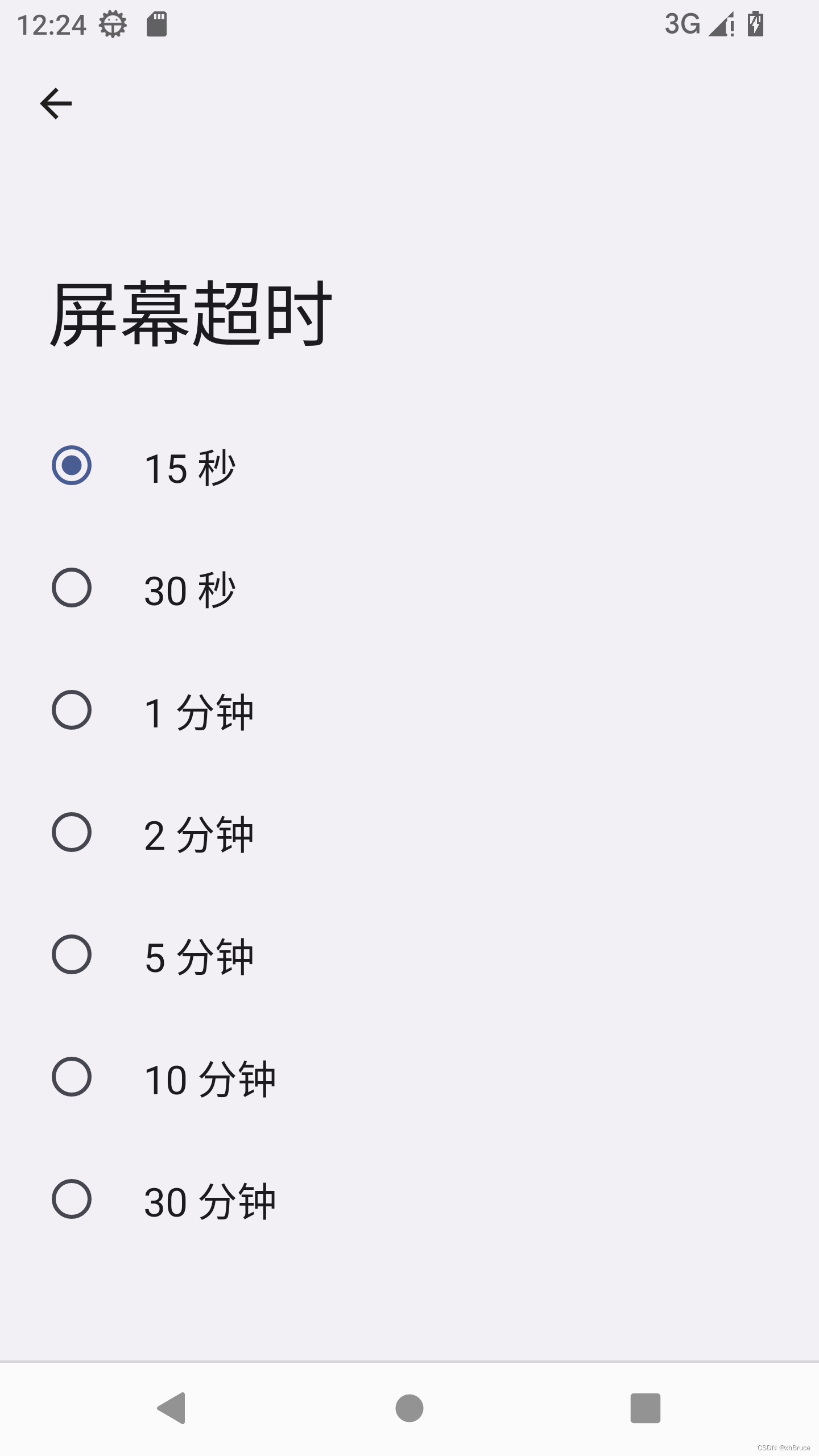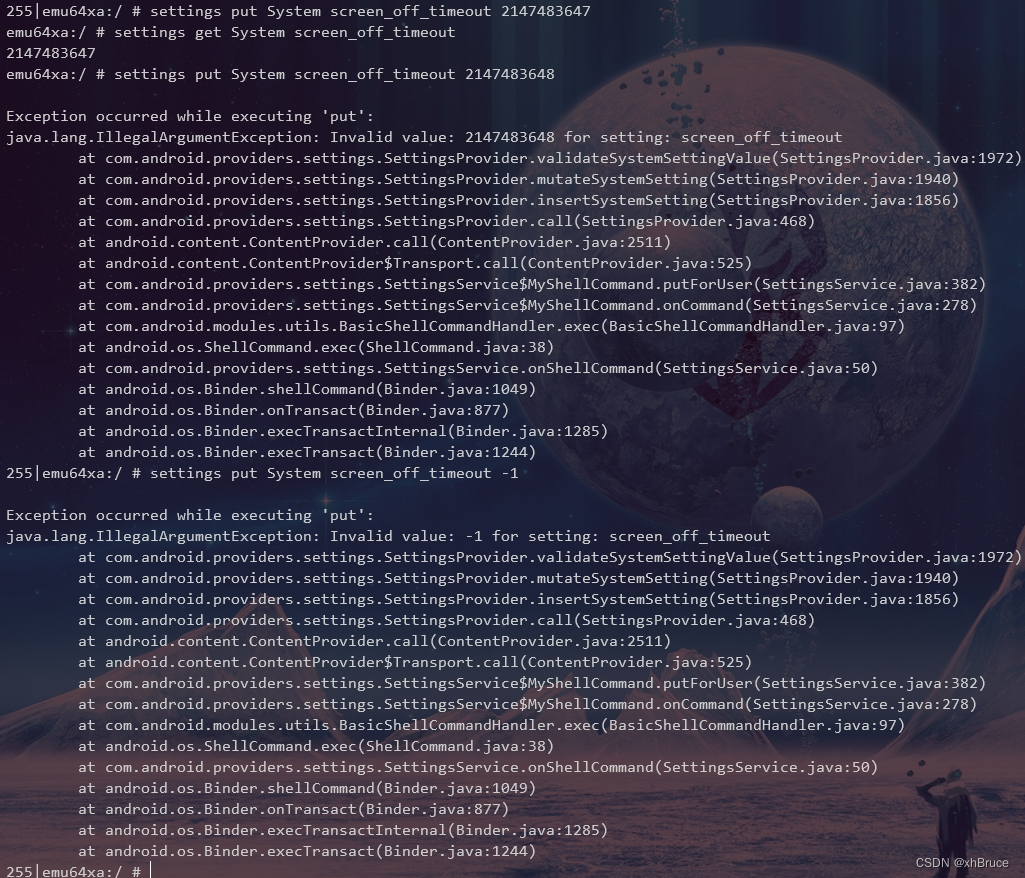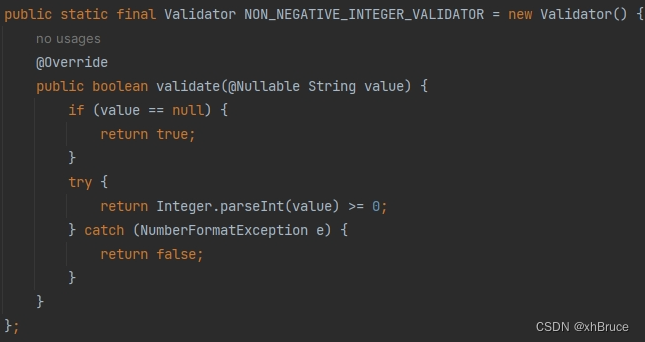屏幕超时休眠-Android13
屏幕超时休眠-Android13
- 1、设置界面
- 1.2 属性值
- 1.2.1 默认值
- 1.2.2 最小值限制
- 1.3 属性值疑问 Settings.System.SCREEN_OFF_TIMEOUT
- 2、超时灭屏
- 2.1 锁定屏幕的超时
- 2.2 屏幕灭屏的超时
- 3、永不休眠
- * 关键日志
1、设置界面
packages/apps/Settings/src/com/android/settings/display/ScreenTimeoutSettings.java
packages/apps/Settings/res/xml/screen_timeout_settings.xml
12-16 12:13:54.707 7976 7976 D SettingsActivity: Switching to fragment com.android.settings.display.ScreenTimeoutSettings
1.2 属性值
Settings.System.SCREEN_OFF_TIMEOUT
adb shell settings get System screen_off_timeout
packages/apps/Settings/res/values/arrays.xml
15 seconds 30 seconds 1 minute 2 minutes 5 minutes 10 minutes 30 minutes 15000 30000 60000 120000 300000 600000 18000001.2.1 默认值
def_screen_off_timeout : frameworks/base/packages/SettingsProvider/res/values/defaults.xml
frameworks/base/packages/SettingsProvider/src/com/android/providers/settings/DatabaseHelper.java
private void loadSystemSettings(SQLiteDatabase db) { SQLiteStatement stmt = null; try { stmt = db.compileStatement("INSERT OR IGNORE INTO system(name,value)" + " VALUES(?,?);"); loadBooleanSetting(stmt, Settings.System.DIM_SCREEN, R.bool.def_dim_screen); loadIntegerSetting(stmt, Settings.System.SCREEN_OFF_TIMEOUT, R.integer.def_screen_off_timeout); // Set default cdma DTMF type loadSetting(stmt, Settings.System.DTMF_TONE_TYPE_WHEN_DIALING, 0); // Set default hearing aid loadSetting(stmt, Settings.System.HEARING_AID, 0); // Set default tty mode loadSetting(stmt, Settings.System.TTY_MODE, 0); loadIntegerSetting(stmt, Settings.System.SCREEN_BRIGHTNESS, R.integer.def_screen_brightness); loadIntegerSetting(stmt, Settings.System.SCREEN_BRIGHTNESS_FOR_VR, com.android.internal.R.integer.config_screenBrightnessForVrSettingDefault); loadBooleanSetting(stmt, Settings.System.SCREEN_BRIGHTNESS_MODE, R.bool.def_screen_brightness_automatic_mode); loadBooleanSetting(stmt, Settings.System.ACCELEROMETER_ROTATION, R.bool.def_accelerometer_rotation); loadIntegerSetting(stmt, Settings.System.USER_ROTATION, R.integer.def_user_rotation); loadDefaultHapticSettings(stmt); loadBooleanSetting(stmt, Settings.System.NOTIFICATION_LIGHT_PULSE, R.bool.def_notification_pulse); loadUISoundEffectsSettings(stmt); loadIntegerSetting(stmt, Settings.System.POINTER_SPEED, R.integer.def_pointer_speed); /* * IMPORTANT: Do not add any more upgrade steps here as the global, * secure, and system settings are no longer stored in a database * but are kept in memory and persisted to XML. * * See: SettingsProvider.UpgradeController#onUpgradeLocked */ } finally { if (stmt != null) stmt.close(); } }frameworks/base/packages/SettingsProvider/res/values/defaults.xml
60000
1.2.2 最小值限制
frameworks/base/services/core/java/com/android/server/power/PowerManagerService.java
mMinimumScreenOffTimeoutConfig = resources.getInteger(com.android.internal.R.integer.config_minimumScreenOffTimeout); Math.max(timeout, mMinimumScreenOffTimeoutConfig);
1.3 属性值疑问 Settings.System.SCREEN_OFF_TIMEOUT
在设置屏幕超时代码代码中,最大值可以为“Long.MAX_VALUE”,属性设置Settings.System.putLong(context.getContentResolver(), SCREEN_OFF_TIMEOUT, value);,但是实质最大值只能是Integer.MAX_VALUE(2147483647);该属性实质在fwk中是Integer保存,获取方式mScreenOffTimeoutSetting = Settings.System.getIntForUser(resolver, Settings.System.SCREEN_OFF_TIMEOUT, DEFAULT_SCREEN_OFF_TIMEOUT, UserHandle.USER_CURRENT);
frameworks/base/packages/SettingsProvider/src/android/provider/settings/validators/SettingsValidators.java 中 NON_NEGATIVE_INTEGER_VALIDATOR 检查非法值
private Long getMaxScreenTimeout(Context context) { if (context == null) { return Long.MAX_VALUE; } final DevicePolicyManager dpm = context.getSystemService(DevicePolicyManager.class); if (dpm == null) { return Long.MAX_VALUE; } mAdmin = RestrictedLockUtilsInternal.checkIfMaximumTimeToLockIsSet(context); if (mAdmin != null) { return dpm.getMaximumTimeToLock(null /* admin */, UserHandle.myUserId()); } return Long.MAX_VALUE; } private String getCurrentSystemScreenTimeout(Context context) { if (context == null) { return Long.toString(FALLBACK_SCREEN_TIMEOUT_VALUE); } else { return Long.toString(Settings.System.getLong(context.getContentResolver(), SCREEN_OFF_TIMEOUT, FALLBACK_SCREEN_TIMEOUT_VALUE)); } } private void setCurrentSystemScreenTimeout(Context context, String key) { try { if (context != null) { final long value = Long.parseLong(key); mMetricsFeatureProvider.action(context, SettingsEnums.ACTION_SCREEN_TIMEOUT_CHANGED, (int) value); Settings.System.putLong(context.getContentResolver(), SCREEN_OFF_TIMEOUT, value); } } catch (NumberFormatException e) { Log.e(TAG, "could not persist screen timeout setting", e); } }2、超时灭屏
2.1 锁定屏幕的超时
更新延时 mLockScreenTimeout 执行 mScreenLockTimeout
frameworks/base/services/core/java/com/android/server/policy/PhoneWindowManager.java
mLockScreenTimeout = Settings.System.getIntForUser(resolver,Settings.System.SCREEN_OFF_TIMEOUT, 0, UserHandle.USER_CURRENT); mHandler.postDelayed(mScreenLockTimeout, mLockScreenTimeout); class ScreenLockTimeout implements Runnable { Bundle options; @Override public void run() { synchronized (this) { if (localLOGV) Log.v(TAG, "mScreenLockTimeout activating keyguard"); if (mKeyguardDelegate != null) { mKeyguardDelegate.doKeyguardTimeout(options); } mLockScreenTimerActive = false; mLockNowPending = false; options = null; } } public void setLockOptions(Bundle options) { this.options = options; } }2.2 屏幕灭屏的超时
updateUserActivitySummaryLocked更新mUserActivitySummary的值,用户活动超时时调用updateUserActivitySummaryLocked,这里获取getScreenOffTimeoutLocked状态更新
frameworks/base/services/core/java/com/android/server/power/PowerManagerService.java
mScreenOffTimeoutSetting = Settings.System.getIntForUser(resolver, Settings.System.SCREEN_OFF_TIMEOUT, DEFAULT_SCREEN_OFF_TIMEOUT, UserHandle.USER_CURRENT); @GuardedBy("mLock") private long getScreenOffTimeoutLocked(long sleepTimeout, long attentiveTimeout) { long timeout = mScreenOffTimeoutSetting; if (isMaximumScreenOffTimeoutFromDeviceAdminEnforcedLocked()) { timeout = Math.min(timeout, mMaximumScreenOffTimeoutFromDeviceAdmin); } if (mUserActivityTimeoutOverrideFromWindowManager >= 0) { timeout = Math.min(timeout, mUserActivityTimeoutOverrideFromWindowManager); } if (sleepTimeout >= 0) { timeout = Math.min(timeout, sleepTimeout); } if (attentiveTimeout >= 0) { timeout = Math.min(timeout, attentiveTimeout); } return Math.max(timeout, mMinimumScreenOffTimeoutConfig); } private void handleUserActivityTimeout() { // runs on handler thread synchronized (mLock) { if (DEBUG_SPEW) { Slog.d(TAG, "handleUserActivityTimeout"); } mDirty |= DIRTY_USER_ACTIVITY; updatePowerStateLocked(); } } /** * Updates the value of mUserActivitySummary to summarize the user requested * state of the system such as whether the screen should be bright or dim. * Note that user activity is ignored when the system is asleep. * * This function must have no other side-effects. */ @GuardedBy("mLock") private void updateUserActivitySummaryLocked(long now, int dirty) { // Update the status of the user activity timeout timer. if ((dirty & (DIRTY_DISPLAY_GROUP_WAKEFULNESS | DIRTY_WAKE_LOCKS | DIRTY_USER_ACTIVITY | DIRTY_WAKEFULNESS | DIRTY_SETTINGS | DIRTY_ATTENTIVE)) == 0) { return; } mHandler.removeMessages(MSG_USER_ACTIVITY_TIMEOUT); final long attentiveTimeout = getAttentiveTimeoutLocked(); final long sleepTimeout = getSleepTimeoutLocked(attentiveTimeout); long screenOffTimeout = getScreenOffTimeoutLocked(sleepTimeout, attentiveTimeout); final long screenDimDuration = getScreenDimDurationLocked(screenOffTimeout); screenOffTimeout = getScreenOffTimeoutWithFaceDownLocked(screenOffTimeout, screenDimDuration); final boolean userInactiveOverride = mUserInactiveOverrideFromWindowManager; long nextTimeout = -1; boolean hasUserActivitySummary = false; for (int idx = 0; idx = powerGroup.getLastWakeTimeLocked()) { groupNextTimeout = lastUserActivityTime + screenOffTimeout - screenDimDuration; if (now = powerGroup.getLastWakeTimeLocked()) { groupNextTimeout = lastUserActivityTimeNoChangeLights + screenOffTimeout; if (now = 0) { final long anyUserActivity = Math.max(lastUserActivityTime, lastUserActivityTimeNoChangeLights); if (anyUserActivity >= powerGroup.getLastWakeTimeLocked()) { groupNextTimeout = anyUserActivity + sleepTimeout; if (now 0) { nextTimeout = Math.min(nextTimeout, nextProfileTimeout); } if (hasUserActivitySummary && nextTimeout >= 0) { scheduleUserInactivityTimeout(nextTimeout); } } private void scheduleUserInactivityTimeout(long timeMs) { final Message msg = mHandler.obtainMessage(MSG_USER_ACTIVITY_TIMEOUT); msg.setAsynchronous(true); mHandler.sendMessageAtTime(msg, timeMs); }3、永不休眠
-
- 在 PowerManagerService 和 PhoneWindowManager 处理
-
- 直接配置 Settings.System.SCREEN_OFF_TIMEOUT 为Integer.MAX_VALUE( 2147483647 = 24.855 天 一般没有这么长时间亮屏待机 ),设置更长时间替换 Settings.System.SCREEN_OFF_TIMEOUT属性 VALIDATORS.put(System.SCREEN_OFF_TIMEOUT, NON_NEGATIVE_INTEGER_VALIDATOR) 中NON_NEGATIVE_INTEGER_VALIDATOR检测为NONE_NEGATIVE_LONG_VALIDATOR
* 关键日志
SettingsActivity:|SubSettings: Launching fragment|start u|ScreenTimeout:|sysui_multi_action: \[757,1754|screen_toggled:|sysui_multi_action:.*screen_timeout|power_screen_state:|PowerManagerService: Waking up|PowerManagerService: Going to sleep
sysui_multi_action: [757,1754,758,4,759,15000]
sysui_multi_action: [757,1754,758,4,759,30000]
sysui_multi_action: [757,1754,758,4,759,60000]
sysui_multi_action: [757,1754,758,4,759,120000]
sysui_multi_action: [757,1754,758,4,759,300000]
sysui_multi_action: [757,1754,758,4,759,600000]
sysui_multi_action: [757,1754,758,4,759,1800000]
12-17 07:13:37.536 645 678 I ActivityTaskManager: START u0 {act=android.intent.action.MAIN cat=[android.intent.category.HOME] flg=0x10000100 cmp=com.google.android.apps.nexuslauncher/.NexusLauncherActivity (has extras)} from uid 0 12-17 07:13:40.128 645 2427 I ActivityTaskManager: START u0 {act=android.intent.action.MAIN cat=[android.intent.category.LAUNCHER] flg=0x10200000 cmp=com.android.settings/.Settings bnds=[581,351][858,771]} from uid 10149 12-17 07:13:46.309 645 2510 I ActivityTaskManager: START u0 {act=android.intent.action.MAIN cmp=com.android.settings/.SubSettings (has extras)} from uid 1000 12-17 07:13:46.408 7976 7976 D SettingsActivity: Switching to fragment com.android.settings.DisplaySettings 12-17 07:13:46.409 7976 7976 D SubSettings: Launching fragment com.android.settings.DisplaySettings 12-17 07:13:48.942 7976 7976 I sysui_multi_action: [757,830,758,4,833,0,854,screen_timeout,1089,0] 12-17 07:13:48.948 645 1716 I ActivityTaskManager: START u0 {act=android.intent.action.MAIN cmp=com.android.settings/.SubSettings (has extras)} from uid 1000 12-17 07:13:49.036 7976 7976 D SettingsActivity: Switching to fragment com.android.settings.display.ScreenTimeoutSettings 12-17 07:13:49.037 7976 7976 D SubSettings: Launching fragment com.android.settings.display.ScreenTimeoutSettings 12-17 07:13:50.690 7976 7976 I sysui_multi_action: [757,1754,758,4,759,15000] 12-17 07:13:52.884 7976 7976 I sysui_multi_action: [757,1754,758,4,759,30000] 12-17 07:13:54.152 7976 7976 I sysui_multi_action: [757,1754,758,4,759,60000] 12-17 07:13:55.559 7976 7976 I sysui_multi_action: [757,1754,758,4,759,120000] 12-17 07:13:57.041 7976 7976 I sysui_multi_action: [757,1754,758,4,759,300000] 12-17 07:13:58.400 7976 7976 I sysui_multi_action: [757,1754,758,4,759,600000] 12-17 07:13:59.653 7976 7976 I sysui_multi_action: [757,1754,758,4,759,1800000] 12-17 07:14:01.446 7976 7976 I sysui_multi_action: [757,1754,758,4,759,15000] 12-17 07:14:16.400 645 708 I PowerManagerService: Going to sleep due to timeout (uid 1000)... 12-17 07:14:17.032 645 645 I power_screen_state: [0,3,0,0,628] 12-17 07:14:17.032 645 645 I screen_toggled: 0 12-17 07:14:17.032 645 645 I sysui_multi_action: [757,804,799,screen_timeout,801,15,802,1] 12-17 07:14:28.765 645 793 I PowerManagerService: Waking up from Asleep (uid=1000, reason=WAKE_REASON_POWER_BUTTON, details=android.policy:POWER)... 12-17 07:14:28.770 645 645 I screen_toggled: 1 12-17 07:14:28.905 645 645 I power_screen_state: [1,0,0,0,110]
-














